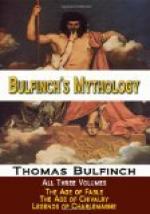Finding himself so powerful at home, Arthur began to form designs for extending his power abroad. So, having prepared his fleet, he first attempted Norway, that he might procure the crown of it for Lot, his sister’s husband. Arthur landed in Norway, fought a great battle with the king of that country, defeated him, and pursued the victory till he had reduced the whole country under his dominion, and established Lot upon the throne. Then Arthur made a voyage to Gaul and laid siege to the city of Paris. Gaul was at that time a Roman province, and governed by Flollo, the Tribune. When the siege of Paris had continued a month, and the people began to suffer from famine, Flollo challenged Arthur to single combat, proposing to decide the conquest of the province in that way. Arthur gladly accepted the challenge, and slew his adversary in the contest, upon which the citizens surrendered the city to him. After the victory Arthur divided his army into two parts, one of which he committed to the conduct of Hoel, whom he ordered to march into Aquitaine, while he with the other part should endeavor to subdue the other provinces. At the end of nine years, in which time all the parts of Gaul were entirely reduced, Arthur returned to Paris, where he kept his court, and, calling an assembly of the clergy and people, established peace and the just administration of the laws in that kingdom. Then he bestowed Normandy upon Bedver, his butler, and the province of Andegavia upon Kay, his steward, [Footnote: This name, in the French romances, is spelled Queux, which means head cook. This would seem to imply that it was a title, and not a name; yet the personage who bore it is never mentioned by any other. He is the chief, if not the only, comic character among the heroes of Arthur’s court. He is the Seneschal or Steward, his duties also embracing those of chief of the cooks. In the romances, his general character is a compound of valor and buffoonery, always ready to fight, and generally getting the worst of the battle. He is also sarcastic and abusive in his remarks, by which he often gets into trouble. Yet Arthur seems to have an attachment to him, and often takes his advice, which is generally wrong.] and several other provinces upon his great men that attended him. And, having settled the peace of the cities and countries, he returned back in the beginning of spring to Britain.
Upon the approach of the feast of Pentecost, Arthur, the better to demonstrate his joy after such triumphant successes, and for the more solemn observation of that festival, and reconciling the minds of the princes that were now subject to him, resolved during that season to hold a magnificent court, to place the crown upon his head, and to invite all the kings and dukes under his subjection to the solemnity. And he pitched upon Caerleon, the City of Legions, as the proper place for his purpose. For, besides its great wealth above the other cities, its situation




